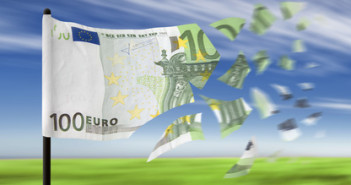The EUR begins the week on a lower tone as the September IFO business sentiment came in lower at 101.4. Â The August number was 102.3 and the consensus was for a slightly higher number at 102.5. Â Adding to the negative feeling, the current assessment fell from 111.1 to 110.3 and expectations fell to 93.2 from 94.2.
The expectations for both those numbers had been 110.9 and 95.0.  It seems that the positive momentum gained over the last few weeks from the ECB announcements is beginning to wane under the weight of poor economic news and the continued uncertainty over whether Spain will request a full scale sovereign bailout. This is a big week for Spain.  On Thursday we will see the government present its draft budget and also announce reforms.  The results of the stress tests on banks will be announced on Friday.  Adding to all of this Moody’s is expected to complete their ratings review on Spain later this week.
Once again when stress enters the markets, traders seek “safe haven†status in the USD and the JPY.  Adding to the EUR woes this morning is the fact that German Chancellor Merkel and French President Hollande are disagreeing on the timetable to introduce joint oversight of the EURO banking sector.  Hollande wants the Euro zone’s banking union started “the earlier, the betterâ€, yet Merkel wants to wait and make sure the quality of the product is there.  So, after all the rhetoric, we revert to fundamentals the debt crisis is looking us square in the face.
Not to be left out of the party, Greece is also in the news as reports from the country say the budget shortfall may be larger than expected and this is causing concern. Â The Greek government and the Troika are taking a break for a week. Â Greek Prime Minister Samaras is still looking to implement EUR 11.5 billion in budget cuts.
The AUD is in the news again as lower economic expectations in China are weighing on the currency.  As the potential for growth in China eases the AUD comes under pressure.  Adding to the Aussie woes are lower commodity prices.  This is making the AUD very vulnerable. China purchases almost 30% of Australia’s exports, so with China’s output falling to its slowest pace in three years, the AUD is feeling the pain.
As I write this piece at 5:00 am, the EUR is threatening support at the 1.2900 level. Â A move through support at 1.2880 would trigger stop loss selling and push the currency towards 1.2850.
Markets will monitor the situation in Spain as the week moves ahead. Â The Asian stock markets were mixed and the European markets have all moved lower after the German IFO release. Â DOW Futures are lower indicating a negative start to the US equity market.



